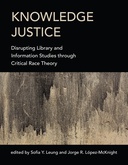Explore

Knowledge Justice
0 Ungluers have
Faved this Work
Login to Fave
Black, Indigenous, and Peoples of Color reimagine library and information science through the lens of critical race theory. In Knowledge Justice, Black, Indigenous, and Peoples of Color scholars use critical race theory (CRT) to challenge the foundational principles, values, and assumptions of library and information science and studies (LIS) in the United States. They propel CRT to center stage in LIS, to push the profession to understand and reckon with how white supremacy affects practices, services, curriculum, spaces, and policies. The contributors show that the field is deeply invested in the false idea of its own objectivity and neutrality, and they go on to show how this relates to assumptions about race. Through deep analyses of library and archival collections, scholarly communication, hierarchies of power, epistemic supremacy, children's librarianship, teaching and learning, digital humanities, and the education system, Knowledge Justice challenges LIS to reimagine itself by throwing off the weight and legacy of white supremacy and reaching for racial justice. Contributors Miranda H. Belarde-Lewis (Zuni and Tlingit), Jennifer Brown, Anastasia Chiu, Nicholae Cline (Coharie), Anne Cong-Huyen, Tony Dunbar, Isabel Espinal, Fobazi M. Ettarh, Jennifer A. Ferretti, April M. Hathcock, Todd Honma, Harrison W. Inefuku, Sarah R. Kostelecky (Zuni Pueblo), Kafi Kumasi, Sofia Y. Leung, Jorge R. López-McKnight, Sujei Lugo, Marisa Méndez-Brady, Myrna Morales, Lalitha Nataraj, Vani Natarajan, Antonia P. Olivas, Kush Patel, Torie Quiñonez, Maria Adoria Rios, Tonia Sutherland, Shaundra Walker, Stacie Williams, Rachel E. Winston
This book is included in DOAB.
Why read this book? Have your say.
You must be logged in to comment.
Editions

